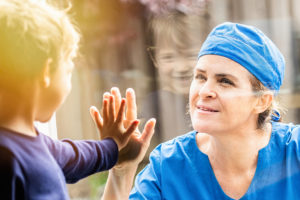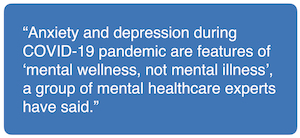Non-medical, non-pathologising resources to help us all survive the COVID-19 crisis
A list of blogs and helpful resources related to the coronavirus pandemic. We will keep adding to this list, to suggest a resource or item for inclusion, please get in touch.
From BJPsych Bulletin: ‘Does COVID-19 pose a challenge to the diagnoses of anxiety and depression? A psychologist’s view.’
“The COVID-19 pandemic has led to predictions of a widespread mental health crisis. However, this makes little sense when fear and anxiety are so understandable in context. The individualisation and medicalisation of normal human reactions disconnects us from our feelings and from the appropriate solutions, in relation to the pandemic and more generally. We have an opportunity to challenge this pervasive way of thinking, and thus be in a position to create a fairer society that is better for everyone’s emotional well-being.”
by Lucy Johnstone 3rd September, 2020. Here
***
From Medium – What The ‘Mentally Ill’ Can Teach Us About Recovering From Crisis by Paul Wilson.
“Only someone who has suffered a profound existential crisis can really understand the destabilising nature of the experience — for they have descended into the sunless, abyssal world of the deep mind, met its strange inhabitants and endured its immense pressures.”
***
Psychologists from the British Psychological Society have produced guidance for key workers and their children on navigating the emotional effects of the Covid-19 pandemic.

The booklet for parents gives some straightforward tips on how they can help their children to cope, which includes:
- Asking the child questions and talking to them
- Giving the child choices over their time
- Making their routine as consistent as possible, particularly at bedtime
- Helping them to understand and share their feelings
Also available from the BPS is a booklet on coping with death and grief during the Covid-19 pandemic.
“The death of a loved one is one of the most difficult emotional experiences that we can have in life. The pain and grief that follows can seem, at times, totally overwhelming.”
***
Panel discussion – Fear and Grief Are Not Mental Illness…(and Never Were)
***
Video: Lived wisdom on panic and worry – This little film is full of big heart-felt wisdom for surviving the impacts of lockdown during the Covid-19 pandemic. It’s part of a larger project that draws on the lived wisdom of 30 people who have been consumers, survivors and ex-patients of mental health services, and has been led by consumer academics at CPN.
***
Rebecca Horn – Mental health and psychosocial support in emergencies: What working in humanitarian settings has taught me about the Covid-19 outbreak in the UK.
“To strengthen psychosocial wellbeing and promote good mental health, we should focus on providing the basics in a way which strengthens relationships and enables participation. If we do this, most people will experience painful feelings during the outbreak and immediately afterwards, but will recover without intervention from mental health specialists.”
***
National Hearing Voices Network – This article has links to a whole range of ideas and resources especially if you hear voices or see visions.
“If you’re struggling to manage during the Covid-19 lockdown – whether you’re shielding, social distancing or self-isolating – you’re not alone. So many of us – whether we hear voices and see visions or not – are finding things tough. There are lots of different ways the current crisis may impact on living with voices, visions and similar sensory experiences. This page is intended to highlight some of these, in the hope it is validating to see them written down, and to connect you with possible sources of support.”
***
Psychologists for Social Change – Imagining another world: Why PSC is calling for a #JustRecovery to the COVID-19 crisis
***
Mad in America, Open Excellence, HOPEnDialogue – View the recording of a recent live Town Hall: Exploring Dialogical Responses in a Time of Crisis.
***
Johann Hari – The coronavirus crisis can teach us to reconnect – I argue that we should call it emotional health, not mental health.
***
Safe Hands Thinking Minds – Some resources to support children and adults around anxiety, worry, stress, and fears; including specific Covid.
***
Working Conversations – Let’s Keep Talking. During these difficult times when our social contact with each other is limited, we would like to make a small contribution to helping keep people feeling sane and connected. We aim to do this through the simple act of talking, perhaps just for 10 or 15 minutes, on a regular basis, over the phone or, to anyone who is feeling isolated, frustrated or scared by their current situation, or who would like a chat about making the best of a difficult time.
***
National Paranoia Network – Many people who Hear Voices or experience Paranoia, will be finding it harder to cope due to the current situation and isolation. The National Paranoia Network has set up a peer support email service. If you would like support you can email National Paranoia Network here.
***
Hearing Voices Network – Covid 19: Surviving Lockdown with Voices & Visions If you’re struggling to manage during the Covid-19 lockdown – whether you’re shielding, social distancing and self-isolating – you’re not alone. So many of us – whether we hear voices and see visions or not – are finding things tough. There are lots of different ways the current crisis may impact on living with voices, visions and similar sensory experiences. This page is intended to highlight some of these, in the hope it is validating to read it on a page, and to connect you with possible sources of support.
***
The Consent Collective – Collection of resources, worksheets and videos to support people through the current crisis At The Consent Collective we’ve been helping people understand the psychology of trauma, relationships, community-change and how to support people through adversity for years. As part of our response to COVID-19 we are making content freely available to the public.
***
Chris Coombs – Coronavirus Stress Response Disorder – And How To Avoid It
***
Alone Together – Regenerative resources in a time of coronavirus The campaigning organisation Extinction Rebellion has put together an evolving list of resources, support groups and activities to help us all during isolation.
***
Nursing Standard – COVID-19: not a ‘mental health crisis’, healthcare experts warn

***
British Psychological Society – Don’t personalise, collectivise!
***
David Kessler – We Are Grieving the World We Have Now Lost
***
ClinPsyEye – Coping in a time of coronavirus
***
National Institute for the Clinical Application of Behavioural Medicine – When the COVID-19 Pandemic Leaves Clients Feeling Helpless
***
Jo Davis – Coronavirus: Understanding your Emotional Responses
***
British Psychological Society – The importance of talking to children about Coronavirus
***
Scott Berinato – That Discomfort You’re Feeling Is Grief
***
Anne Cooke – Five tips to help look after our health and wellbeing during lockdown
***
Elizabeth Gregory – Tips to share with children to help them cope with the new normal and getting through lockdown together with teenagers
***
Reawaken Australia – COVID-19 is not a mental illness: Embracing meaningful, shared human emotions
***
Susan Mcpherson and Jeppe Oute – In Lockdown With Depression
***
JUST LISTENING FOR COVID-19 – Emotional distress around COVID-19 is not a ‘mental illness’: It is an understandable and common human experience
***
Lived wisdom on panic, worry and isolation: stories to support the community amid the COVID-19 crisis, from mental health service users, survivors and ex-patients
***
Mad in America – “Not Fragile”: Survivor-Led Mutual Aid Projects Flourish in a Time of Crisis
***
Dr. Lucy Johnstone writing in the Guardian says it is wrong to view our natural fears as mental health disorders, also interviewed on Sky News.
***



